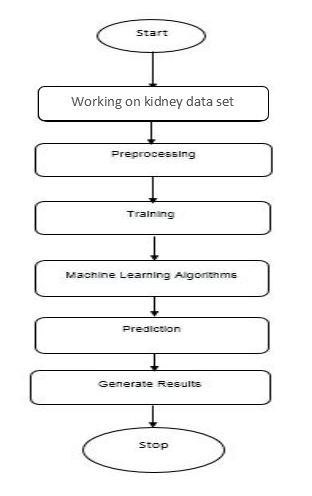Detection of Chronic Kidney Disease using Machine Learning and Deep Learning Algorithms
Project Code :TCPGPY271
Objective
The main objective of this project is to detect the chronic kidney disease detection using machine learning and deep learning algorithms.
Abstract
Chronic kidney disease (CKD) is a global health
problem with high morbidity and mortalityrate, and it induces other diseases.
Since there are no obvious symptoms during the early stages of CKD, patients
often fail to notice the disease. Early detection of CKD enables patients to
receive timely treatment to ameliorate the progression of this disease. Machine
learning models can effectively aid clinicians achieve this goal due to their
fast and accurate recognition performance. In this study, we propose a machine
learning methodology for diagnosing CKD. The CKD data set was obtained from the
University of California Irvine (UCI) machine learning repository, which has a
large number of missing values. KNN imputation was used to fill in the missing
values, which selects several complete samples with the most similar
measurements to process the missing data for each incomplete sample. Missing
values are usually seen in real-life medical situations because patients may
miss some measurements for various reasons. After effectively filling out the
incomplete data set, six machine learning algorithms (logistic regression,
random forest, support vector machine, k-nearest neighbor, Naive Bayes
classifier and feed forward neural network) were used to establish models.
Among these machine learning models, random forest achieved the best accuracy.
By analyzing the misjudgments generated by the established models, we proposed
an integrated model that combines logistic regression and random forest by
using perceptron, best accuracy hence, we speculated that this methodology
could be applicable to more complicated clinical data for disease diagnosis.
NOTE: Without the concern of our team, please don't submit to the college. This Abstract varies based on student requirements.
Block Diagram

Specifications
Hardware:
Operating system : Windows 7 or 7+
RAM : 8 GB
Hard disc or SSD : More than 500 GB
Processor : Intel 3rd generation or high or Ryzen with 8 GB Ram
Software:
Software’s : Python 3.6 or high version
IDE : PyCharm.
Framework : Flask
Learning Outcomes
- · About Classification in machine learning.
- · About preprocessing techniques.
- · About Logistic Regression.
- · About Support Vector Machine.
- · About Random Forest.
- · About k-nearest neighbor.
- · About Naive Bayes classifier.
- · About Neural network.
- · Knowledge on PyCharm Editor.
Related Topics





 Paper Publishing
Paper Publishing
